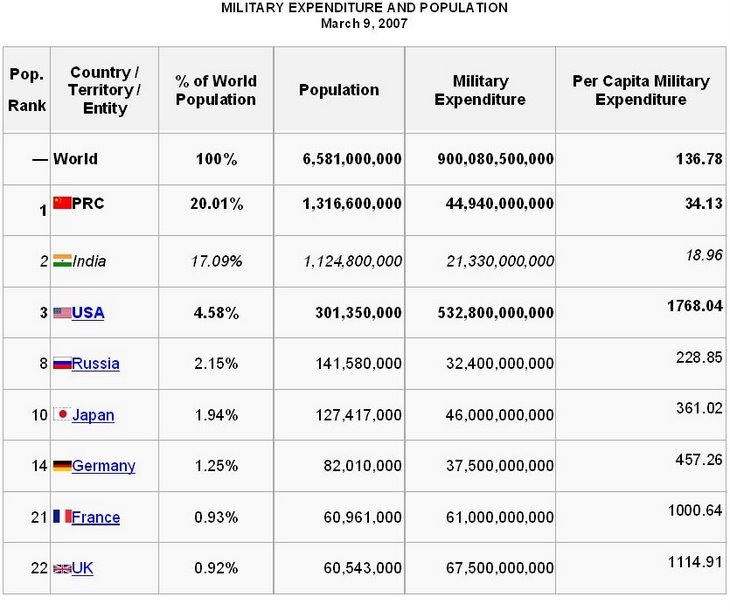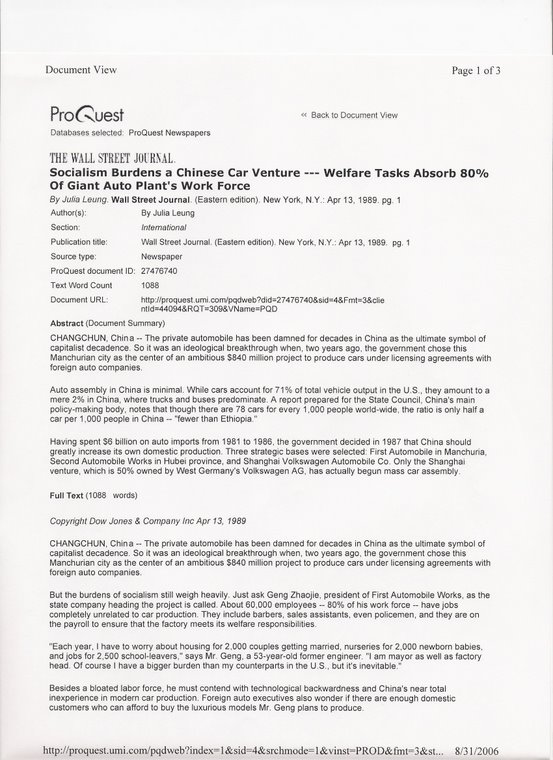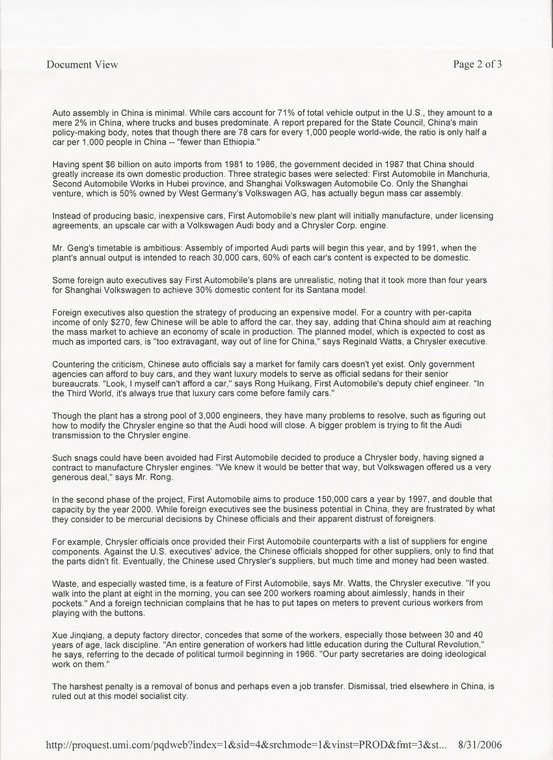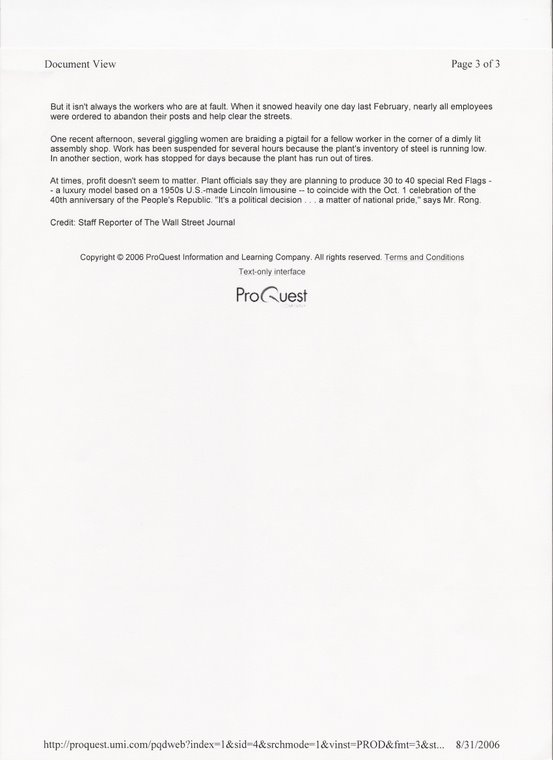The press distortions and promotion of anti-China opinions and incidence suggest a pattern with the purpose of embarrassing China in an effort to counteract the positive effect which its hosting the 2008 Olympics will have on its global reputation. Millions around the world will see the capabilities of a country that has witnessed centuries of travail and has emerged as a contender for world recognition of its contribution to development.
A sequence of events began some months ago with the Dalai Lama’s visit to the State Department. Subsequently, there were alarmist reports of China’s doubling its military expenditures and notes on Spielberg’s resignation as Artistic Advisor for the 2008 Beijing Olympics as an objection to an accusation that China was supporting dissension in Darfur (though, quite the opposite was true in its collaboration with the United Nations). The children’s toy fiasco went by with little mention of the apology by Mattel for its influence which apparently was based on cost calculations to avoid higher prices. Presently, the sudden eruption of destructive events by Buddhist demands for separation caused a degree of violence that was answered by the Chinese authorities as it might have been in any other country, we then learned that thousands had NOT been killed in the melee.
This disruption will blow over as other have. The Spielberg incident on China’s policy towards Africa (a distortion of fact) has melted away in the light of its principle of peaceful economic relations for the mutual benefit of both countries. Time will show that the Tibetan incidents will be exposed in a peaceful manner.
Please note the correction and explanation to this inaccurate statement below:
The Chinese government is now considering the question of whether they wish to administer Tibet, which had been turned over to them by the British four-hundred years ago who turned down its occupation because it didn’t pay off.
True, efforts are being made by the US in some areas to accommodate China’s rise as an economic rival. This is understandable since China has the advantage of learning much from capitalism, building its productive forces while simultaneously introducing economic planning and regulating the movement of capital and pricing structures in its socialist market economy. They have enough problems dealing with accommodation to private ownership at the same time that they build up conditions of the working class. Their objective is to form a Harmonious Society which includes private property, entrepreneurism and the social welfare of the working population in peaceful solutions to differences between these groups. In the past two years, 75% of foreign owned enterprises have signed union contracts. The unions are asking for a schedule of wage increases depending upon time and tenure of members of the work force. This is only one incident of differences which will have to be resolved in manners that differ from the union experiences in the United States from Hay Market in the 19th Century through the first half of the 20th.
We believe that the success of the 2008 Olympics with the special beauty of Chinese cultural structures and modern touch will bring more peace to the world as it opens its eyes to reality and lessens the possibility of military conflict.
*Those who read this have a right to disagree; I invite comments and differences of opinion but simultaneously expect readers to have an open mind and consider this point of view.
Sidney J. Gluck
New York City
March 25, 2008
Note: In order to encourage dialogue we will publish your opinions and Sidney Gluck's responses as part of this blog.
A CORRECTION TO THE BLOG OF MARCH 5, 2008
“DISTORTIONS IN THE PRESS RE: CHINA-TIBET”
Dear Friends,
I wish to acknowledge a correction to a reference in my last essay on the media and China called to my attention by a number of respondents.
I stated that administration of Tibet “had been turned over to them (China) by the British four-hundred years ago when its occupation no longer seemed prosperous.” This is incorrect. This concept emerged from talks and lectures I had been to over the years - not from my reading. I’ve since done my homework.
While it is true that the British, especially in the 19th and 20th Century, were involved in Tibetan affairs its influence was washed away as imperialism withdrew its control of China after 1912. The relationship between Tibet and China had been cemented for over 400 years long before the present government undertook administration of the province. In the 17th – 19th centuries, two rival Tibetan Buddhist schools were vanquished by the Lhasa school which had established the position of Dalai Lama as the religious leader who, at that time, had civil relations with the Mongols, Russians and Chinese. A change of civil relations occurred when the fifth Dalai Lama visited the Manchu emperor, Shunzhi, in 1652 in Beijing and received the seal of provincial administration without being required to kowtow. From this point on, Tibet is continuously linked with China. It was not the British who abandoned Tibet to the Chinese, but the Tibetans who linked themselves to Beijing through civil authority.
This information is published on wikipedia.com
http://en.wikipedia.org/wiki/History_of_Tibet
We attach the table of contents from the hyperlinked page for your perusal. You will note shifts in various centuries during which Tibet’s relationship with Beijing is a relative constant in the background (this information is found in sections 9, 11 and 15).
Tibetan history is replete with political and religious interference up until the present day. At the same time, China’s presence has continued regardless of their own lack of modernization, a situation which has changed under the present regime of the CPC which, in developing the country as a whole, has included economic changes in Tibet. These economic changes aren’t anti-Tibet, but they are positive developments of forces of production and exchange which include an increase in Han participation. Historically, it is a fact that until the Chinese Communists gained control of the central government, a conflict developed between the religious leadership of Tibetan Buddhism and the growth of secular political relations
Without making a judgment at this point for my readers and friends, I recommend that you check the history of Tibet as noted above, especially sections 11-14 and then sections 15-21, the latter dealing with the current situation.
As I write to you, Wen Jibao, the Premier of China’s National Congress and number two in the political hierarchy, has issued a public statement that the Dalai Lama is welcome to come to Beijing and set only one condition: that he does not advocate separation of Taiwan and Tibet from the PRC. I suppose, should he go to Beijing for discussions, it is possible to arrange for his position as a religious leader to be respected and conversely that the religious community would respect the national economic and political restructuring and authority, both provincial and central.
To those of you who did communicate, I wish to thank you and assure my friends that I will be very careful to fact-check my memory and reexamine any questionable information.
Sidney J. Gluck
New York City
April 3, 2008












No comments:
Post a Comment